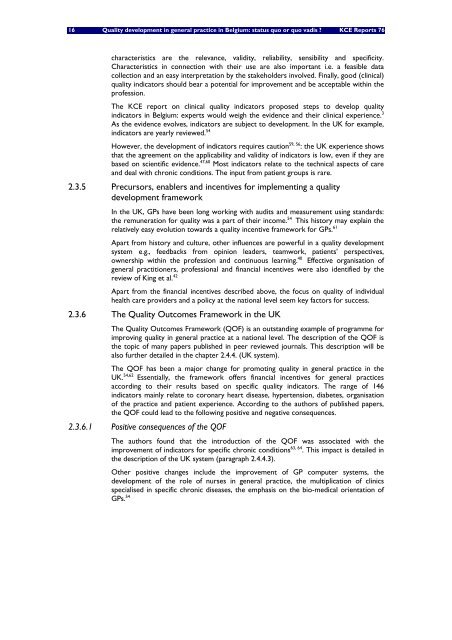status quo of quo vadis? - KCE
status quo of quo vadis? - KCE
status quo of quo vadis? - KCE
You also want an ePaper? Increase the reach of your titles
YUMPU automatically turns print PDFs into web optimized ePapers that Google loves.
16 Quality development in general practice in Belgium: <strong>status</strong> <strong>quo</strong> or <strong>quo</strong> <strong>vadis</strong> ? <strong>KCE</strong> Reports 76<br />
characteristics are the relevance, validity, reliability, sensibility and specificity.<br />
Characteristics in connection with their use are also important i.e. a feasible data<br />
collection and an easy interpretation by the stakeholders involved. Finally, good (clinical)<br />
quality indicators should bear a potential for improvement and be acceptable within the<br />
pr<strong>of</strong>ession.<br />
The <strong>KCE</strong> report on clinical quality indicators proposed steps to develop quality<br />
indicators in Belgium: experts would weigh the evidence and their clinical experience. 3<br />
As the evidence evolves, indicators are subject to development. In the UK for example,<br />
indicators are yearly reviewed. 54<br />
However, the development <strong>of</strong> indicators requires caution 59, 56 : the UK experience shows<br />
that the agreement on the applicability and validity <strong>of</strong> indicators is low, even if they are<br />
based on scientific evidence. 47,60 Most indicators relate to the technical aspects <strong>of</strong> care<br />
and deal with chronic conditions. The input from patient groups is rare.<br />
2.3.5 Precursors, enablers and incentives for implementing a quality<br />
development framework<br />
In the UK, GPs have been long working with audits and measurement using standards:<br />
the remuneration for quality was a part <strong>of</strong> their income. 54 This history may explain the<br />
relatively easy evolution towards a quality incentive framework for GPs. 61<br />
Apart from history and culture, other influences are powerful in a quality development<br />
system e.g., feedbacks from opinion leaders, teamwork, patients’ perspectives,<br />
ownership within the pr<strong>of</strong>ession and continuous learning. 40 Effective organisation <strong>of</strong><br />
general practitioners, pr<strong>of</strong>essional and financial incentives were also identified by the<br />
review <strong>of</strong> King et al. 42<br />
Apart from the financial incentives described above, the focus on quality <strong>of</strong> individual<br />
health care providers and a policy at the national level seem key factors for success.<br />
2.3.6 The Quality Outcomes Framework in the UK<br />
The Quality Outcomes Framework (QOF) is an outstanding example <strong>of</strong> programme for<br />
improving quality in general practice at a national level. The description <strong>of</strong> the QOF is<br />
the topic <strong>of</strong> many papers published in peer reviewed journals. This description will be<br />
also further detailed in the chapter 2.4.4. (UK system).<br />
The QOF has been a major change for promoting quality in general practice in the<br />
UK. 54,62 Essentially, the framework <strong>of</strong>fers financial incentives for general practices<br />
according to their results based on specific quality indicators. The range <strong>of</strong> 146<br />
indicators mainly relate to coronary heart disease, hypertension, diabetes, organisation<br />
<strong>of</strong> the practice and patient experience. According to the authors <strong>of</strong> published papers,<br />
the QOF could lead to the following positive and negative consequences.<br />
2.3.6.1 Positive consequences <strong>of</strong> the QOF<br />
The authors found that the introduction <strong>of</strong> the QOF was associated with the<br />
improvement <strong>of</strong> indicators for specific chronic conditions 63, 64 . This impact is detailed in<br />
the description <strong>of</strong> the UK system (paragraph 2.4.4.3).<br />
Other positive changes include the improvement <strong>of</strong> GP computer systems, the<br />
development <strong>of</strong> the role <strong>of</strong> nurses in general practice, the multiplication <strong>of</strong> clinics<br />
specialised in specific chronic diseases, the emphasis on the bio-medical orientation <strong>of</strong><br />
GPs. 54

















